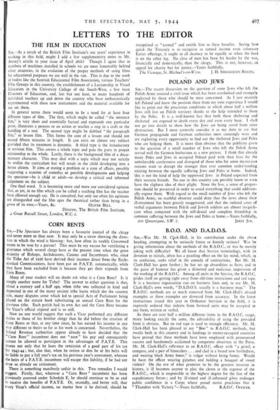CORN RENTS
Sut,—The Spectator has always been a favourite journal of the clergy and never more so than now. It may only be a straw showing the direc- tion in which the wind is blowing: but, how often its weekly Crossword seems to be won by a parson! This must be my excuse for ventilating a grievance which several clergy have at the present time when the great majority of Bishops, Archdeacons, Canons and Incumbents who, since the Tithe Act of 5926 have derived their incomes direct from the Eccle- siastical Commissioners, have been put on P.A.Y.E. automatically, while they have been excluded from it because they get their stipends from Corn Rents.
Many of your readers will no doubt ask what is a Corn Rent? Is it simply another name for Tithe? The answer to either question is that, about a century and a half ago, when tithe was collected in kind and deposited in one of the many ancient tithe barns which dot the country side, may disputes arose which led to special Acts of Parliament being placed on the statute book substituting an annual Corn Rent for the previous tithe. Each parish had its own Act and the Corn Rent became the Vicar's official stipend and is so still.
Now no one would suggest that such a Vicar performed any different duties to those of his brother clergy than he did before the creation of Corn Rents or that, at any time since, he has earned his income in any Way different to theirs so far as his work is concerned. Nevertheless, the Inland Revenue authorities appear already to have decided that the "Corn Rent" incumbent does not " earn " his pay and consequently cannot be allowed to participate in the advantages of P.A.Y.E. This means not only that he loses the remission of a good part of his tax for 1943-44; but, also that, when he retires or dies he or his heirs will be liable to pay a full year's tax on his previous year's assessment, whereas the heirs of a P.A.Y.E. incumbent will escape this liability, if he had not done so already on retirement.
There is something manifestly unfair in this. Two remedies I would tuggest. Firstly, that, wherever a "Corn Rent" incumbent has been Previously ,assessed under Schedule E, he should continue to be so and to receive the benefits of P.A.Y.E. Or, secondly, and better still, that every Vicar's official income, no matter how it be derived, should be recognised as " earned " and entitle him to these benefits. Seeing how quick the Treasury is to recognise as earned income even voluntary Easter offerings, it ought in all decency to be equally so when the boot is on the other leg. No class of men has been hit harder by the war, financially and domestically, than the clergy. This is not, however, an appeal for charity but for justice.—Yours faithfully, The Vicarage, St. Michael's-on-Wyre. J. H. SHAC.XLETON BAILEY,






















 Previous page
Previous page